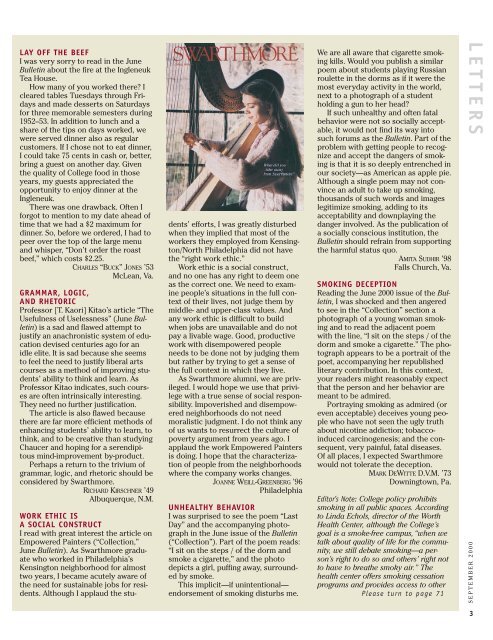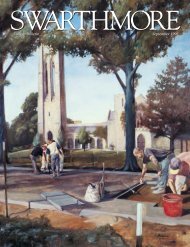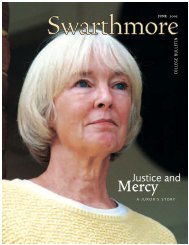SWARTHMORE
Swarthmore College Bulletin (September 2000) - ITS
Swarthmore College Bulletin (September 2000) - ITS
- No tags were found...
You also want an ePaper? Increase the reach of your titles
YUMPU automatically turns print PDFs into web optimized ePapers that Google loves.
LAY OFF THE BEEFI was very sorry to read in the JuneBulletin about the fire at the IngleneukTea House.How many of you worked there? Icleared tables Tuesdays through Fridaysand made desserts on Saturdaysfor three memorable semesters during1952–53. In addition to lunch and ashare of the tips on days worked, wewere served dinner also as regularcustomers. If I chose not to eat dinner,I could take 75 cents in cash or, better,bring a guest on another day. Giventhe quality of College food in thoseyears, my guests appreciated theopportunity to enjoy dinner at theIngleneuk.There was one drawback. Often Iforgot to mention to my date ahead oftime that we had a $2 maximum fordinner. So, before we ordered, I had topeer over the top of the large menuand whisper, “Don’t order the roastbeef,” which costs $2.25.CHARLES “BUCK” JONES ’53McLean, Va.GRAMMAR, LOGIC,AND RHETORICProfessor [T. Kaori] Kitao’s article “TheUsefulness of Uselessness” (June Bulletin)is a sad and flawed attempt tojustify an anachronistic system of educationdevised centuries ago for anidle elite. It is sad because she seemsto feel the need to justify liberal artscourses as a method of improving students’ability to think and learn. AsProfessor Kitao indicates, such coursesare often intrinsically interesting.They need no further justification.The article is also flawed becausethere are far more efficient methods ofenhancing students’ ability to learn, tothink, and to be creative than studyingChaucer and hoping for a serendipitousmind-improvement by-product.Perhaps a return to the trivium ofgrammar, logic, and rhetoric should beconsidered by Swarthmore.RICHARD KIRSCHNER ’49Albuquerque, N.M.WORK ETHIC ISA SOCIAL CONSTRUCTI read with great interest the article onEmpowered Painters (“Collection,”June Bulletin). As Swarthmore graduatewho worked in Philadelphia’sKensington neighborhood for almosttwo years, I became acutely aware ofthe need for sustainable jobs for residents.Although I applaud the students’efforts, I was greatly disturbedwhen they implied that most of theworkers they employed from Kensington/NorthPhiladelphia did not havethe “right work ethic.”Work ethic is a social construct,and no one has any right to deem oneas the correct one. We need to examinepeople’s situations in the full contextof their lives, not judge them bymiddle- and upper-class values. Andany work ethic is difficult to buildwhen jobs are unavailable and do notpay a livable wage. Good, productivework with disempowered peopleneeds to be done not by judging thembut rather by trying to get a sense ofthe full context in which they live.As Swarthmore alumni, we are privileged.I would hope we use that privilegewith a true sense of social responsibility.Impoverished and disempoweredneighborhoods do not needmoralistic judgment. I do not think anyof us wants to resurrect the culture ofpoverty argument from years ago. Iapplaud the work Empowered Paintersis doing. I hope that the characterizationof people from the neighborhoodswhere the company works changes.JOANNE WEILL-GREENBERG ’96PhiladelphiaUNHEALTHY BEHAVIORI was surprised to see the poem “LastDay” and the accompanying photographin the June issue of the Bulletin(“Collection”). Part of the poem reads:“I sit on the steps / of the dorm andsmoke a cigarette,” and the photodepicts a girl, puffing away, surroundedby smoke.This implicit—if unintentional—endorsement of smoking disturbs me.We are all aware that cigarette smokingkills. Would you publish a similarpoem about students playing Russianroulette in the dorms as if it were themost everyday activity in the world,next to a photograph of a studentholding a gun to her head?If such unhealthy and often fatalbehavior were not so socially acceptable,it would not find its way intosuch forums as the Bulletin. Part of theproblem with getting people to recognizeand accept the dangers of smokingis that it is so deeply entrenched inour society—as American as apple pie.Although a single poem may not convincean adult to take up smoking,thousands of such words and imageslegitimize smoking, adding to itsacceptability and downplaying thedanger involved. As the publication ofa socially conscious institution, theBulletin should refrain from supportingthe harmful status quo.AMITA SUDHIR ’98Falls Church, Va.SMOKING DECEPTIONReading the June 2000 issue of the Bulletin,I was shocked and then angeredto see in the “Collection” section aphotograph of a young woman smokingand to read the adjacent poemwith the line, “I sit on the steps / of thedorm and smoke a cigarette.” The photographappears to be a portrait of thepoet, accompanying her republishedliterary contribution. In this context,your readers might reasonably expectthat the person and her behavior aremeant to be admired.Portraying smoking as admired (oreven acceptable) deceives young peoplewho have not seen the ugly truthabout nicotine addiction; tobaccoinducedcarcinogenesis; and the consequent,very painful, fatal diseases.Of all places, I expected Swarthmorewould not tolerate the deception.MARK DEWITTE D.V.M. ’73Downingtown, Pa.Editor’s Note: College policy prohibitssmoking in all public spaces. Accordingto Linda Echols, director of the WorthHealth Center, although the College’sgoal is a smoke-free campus,“when wetalk about quality of life for the community,we still debate smoking—a person’sright to do so and others’ right notto have to breathe smoky air.” Thehealth center offers smoking cessationprograms and provides access to otherPlease turn to page 71L E T T E R SS E P T E M B E R 2 0 0 03
















